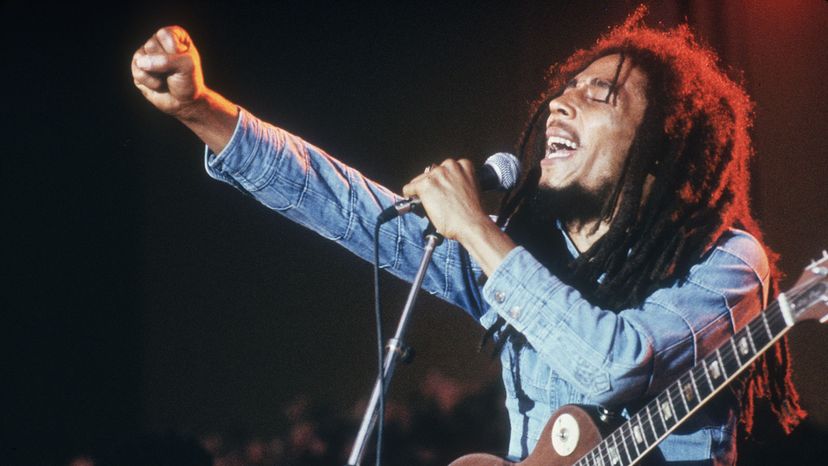Traditional Jamaican Music

While African-based drumming, chants, work songs and folk songs have existed since slavery times, what the world thinks of as Jamaican music dovetailed with the wide availability of radio, carrying rhythm-and-blues music from American stations to the island, where it mixed with local music styles to create new forms of expression.
Ska was the first internationally known Jamaican music genre. Ska used American-style R&B but Jamaicanized it with banjo strumming, drumming on the offbeat and a horn section [source: Meschino]. You can hear the fast syncopated beat in songs from bands like Madness and No Doubt.
Advertisement
The beat began to slow down in the mid-60s (some said that the hot summer was of 1966 was the cause!), giving way to rock steady, soon to be followed by the even-slower paced reggae [source: BBC]. Reggae had deeper bass lines, African-style drumming and lyrics that focused on politics and praises to "Jah" rather than partying. Bob Marley is the best-known reggae musician and indeed, the best-known Jamaican.
So how did Bob Marley become so famous? "Marley was a musical genius for a multicultural age," opined Christopher John Farley of Time magazine, which named Marley's "Exodus" the best album of the 20th century. Marley was embraced by herb-loving college students as well as by oppressed people in Africa, the Caribbean and all over the world.
Marley's death in 1981 seemed to signal a change in musical styles as well. Reggae (soon to be called "roots reggae") gave way to dancehall, a stripped down version of reggae with an emphasis on producer-created sounds, very heavy bass lines over which singers sang or "toasted" (talked over the rhythm track) [source: BBC]. Actually, some form of dancehall had always existed in the streets and dancehalls of urban Jamaica when DJs would toast over the hits played on traveling sound systems.
One feature of dancehall is "slackness" -- lyrics focusing on guns, raw sexuality or homophobia. Famous singers include Yellowman, Buju Banton, and Vybz Kartel. Poppified dancehall can be heard on hits from Sean Paul as well as lending flavor to songs like "Fly" by Sugar Ray. Dancehall is currently the dominant style in Jamaica, though some musicians keep the roots reggae flag flying.
Jamaican music has also influenced styles beyond its borders. In the 1970s, a Jamaica-born DJ named Kool Herc began holding parties in the South Bronx where he isolated and extended the instrumental portion of the record ("the break") on his two turntables and toasted on the microphone in imitation of the dancehall style back home [source: Chang]. This was the beginning of rap.
For more on cultural traditions around the world, fly to the links below.
Related Articles
Sources
- BBC. "The Story of Reggae." (Aug. 26, 2011). http://www.niceup.com/history/bbc/dancehall.html
- Chang, Jeff. "Can't Stop, Won't Stop: A History of the Hip-Hop Generation." St. Martin's Press. 2005
- CIA Factbook. "Jamaica". (Aug. 26, 2011).https://www.cia.gov/library/publications/the-world-factbook/geos/jm.html
- Farley, Christopher John. "Remembering Bob Marley." TIME. Feb. 4, 2005. (Aug. 26, 2011). http://www.time.com/time/arts/article/0,8599,1024886,00.html#ixzz1W4WClkHb
- Government of Jamaica. "How We Celebrate Emancipation Day." (Aug. 26, 2011). http://www.emancipationpark.org.jm/about-us/emancipation-day-celebration.php
- Jamaica Observer. "High Prices, Low Jobs". (Sept. 9, 2011) http://www.jamaicaobserver.com/business/High-prices--low-jobs_8301407
- Jamaicans.com. Christmas in Jamaica. (Aug. 26, 2011) http://www.jamaicans.com/culture/christmas/index.shtml
- Jamaicans.com. "Jamaican Easter Traditions Steeped In Culture And History." (Aug. 26, 2011) http://www.jamaicans.com/news/announcements/easter-2.shtml
- Jamaica Observer. "Jamaica Independence Festival Launched in Style." (Aug. 26, 2011). http://www.jamaicaobserver.com/entertainment/Jamaica-Independence-Festival-2011-launched-in-style_9155973
- Meschino, Patricia. "Ska, Ska, Ska, Jamaica Ska." Tapestry of Jamaica. MacMillan Caribbean. 2003
- Porto Rico Importing Company. "Jamaican Blue Mountain" (Sept. 8, 2011) http://portorico.com/store/product227.html
- Religion Facts. "Rastafari." (Aug. 26, 2011). http://www.religionfacts.com/a-z-religion-index/rastafarianism.htm
- The Kitchen Project. "The History of Jamaican Jerk." (Aug. 26, 2011). http://kitchenproject.com/history/JerkChicken/index.htm
- Thame, Camilo. "20 Per Cent of Jamaicans Living in Poverty." Jamaica Observer. (Sept. 9, 2011) http://www.jamaicaobserver.com/news/20-per-cent-of-Jamaicans-living-in-poverty
- Tortello, Rebecca. "Christmas A Come." Pieces of the Past. (Aug. 26, 2011). http://jamaica-gleaner.com/pages/history/story0016.html
- Trading Economics. "Emigration rate of tertiary educated (% of total tertiary educated population) in Jamaica." (Aug. 26, 2011). http://www.tradingeconomics.com/jamaica/emigration-rate-of-tertiary-educated-percent-of-total-tertiary-educated-population-wb-data.html
- Tropical Isle Living. "Ackee and Saltfish." http://www.tropicisleliving.com/?page_id=895
- University of the West Indies. Jamaican Ackee. (Aug. 26, 2011). http://wwwchem.uwimona.edu.jm:1104/lectures/ackee.html
- Wignall, Mark. "Why has Jamaica's Crime Rate Fallen?" Jamaica Observer. Feb. 3, 2011. (Aug. 26, 2011) http://www.jamaicaobserver.com/columns/Why-has-Jamaica-s-crime-rate-fallen_8329778